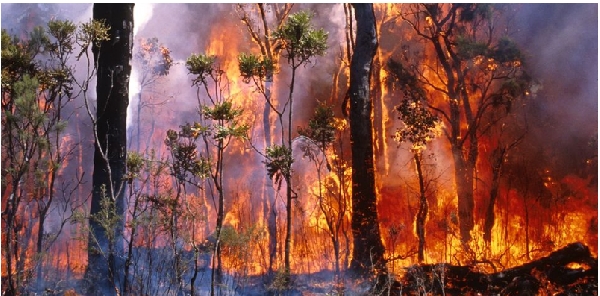
DAR ES SALAAM, Feb 4 (NNN-AGENCIES) — The government has reported a remarkable 300 percent decrease in bushfire incidents in 2023 compared to the previous year, leading to significant biodiversity conservation across the country.
The Conservation Commissioner and CEO of the Tanzania Forest Services Agency (TFS), Prof Dos Santos Silayo, highlighted the importance of addressing the risks posed by wildfires to the country’s natural forests.
To effectively combat and control bushfires, Prof Silayo emphasised the need for enhanced education and awareness campaigns on fire prevention.
He also stressed the importance of supporting local communities and strengthening fire prevention and suppression measures nationwide.
Providing specific figures, Prof Silayo revealed that approximately 3,700 hectares of natural forests were affected by fires in 2022, whereas only 740 hectares were recorded in the following year.
“This decline can be attributed to a range of interventions, including educational initiatives and the relocation of people engaged in human activities within natural forest areas,” said Prof Silayo.
According to Prof Silayo, human existence is intricately linked to plant life, underscoring the urgent need to scale up conservation efforts.
Tanzania’s Forest Legislation of 2002 designates natural forest reserves as protected areas of paramount importance for biodiversity conservation.
The country is home to 12 natural forest reserves, eight of which are located in the Eastern Arc Mountains.
The TFS is committed to improving the management and conservation of these reserves while also generating sustainable revenue sources to support both reserve management and the surrounding communities’ development endeavours.
However, despite these efforts and the significant socioeconomic benefits offered by forests, bushfires continue to pose a real challenge to the environment.
To mitigate human-induced impacts on natural forests, Prof Silayo explained that clearly defined borders have been established and local communities living near these forests have been informed in order to reduce the extent of devastation.
“While some communities willingly agreed to relocate, such as in Geita and Bukombe, others rejected the proposal, and so we had to force them out,” said the professor.
He said the overdependence of the public on firewood and charcoal as the primary energy sources has contributed to the rise in bushfire incidents.
Irresponsible use of fire near forests and the practice of using fire to chase wild animals have also exacerbated the problem.
In response, an educational programme has been initiated to raise awareness among surrounding communities about the importance of tree planting.
The aim is to shift away from unsustainable practices and foster a sustainable approach to natural resource management. — NNN-AGENCIES
